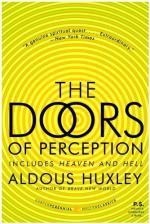
|
| Name: _________________________ | Period: ___________________ |
This test consists of 5 multiple choice questions, 5 short answer questions, and 10 short essay questions.
Multiple Choice Questions
1. What are the first objects upon which the author intently focuses during the experiment?
(a) Some pens and pencils in a cup on his desk.
(b) The books on his shelves.
(c) The table and chairs in the room.
(d) Three flowers in a vase on the table.
2. What chemicals were released into the bloodstream during the act of self-flagellation?
(a) Adrenalin and histamines.
(b) Histamines and endorphins.
(c) Endorphins and serotonin.
(d) Serotonin and adrenalin.
3. According to the author, what is theatrical spectacle?
(a) A means by which those without access to high culture can enjoy pageantry.
(b) A way of communicating morals and values to lower-class citizens.
(c) A transporting and enlightening form of pageantry.
(d) Pageantry without religious or political overtones.
4. What does the author say about vision-inducing devices and effects at the beginning of Appendix 3?
(a) They have played a greater role in popular entertainment than in fine arts.
(b) They have played a greater role in popular entertainment than in religion.
(c) They have played a greater role in religion than in fine art.
(d) They have played a greater role in fine art than in popular entertainment.
5. Why are marble and stone often particularly impressive materials in art?
(a) Because the pieces made from them are usually very large.
(b) Because they last longer than many other pieces of art.
(c) Because they are so hard to find.
(d) Because they are more difficult to work with than other media.
Short Answer Questions
1. According to the author, at the end of Appendix 1 what is one claim that is made almost universally by visionaries?
2. How did "pyrotechny" begin in Europe, according to the author?
3. What happens when mescalin or LSD is used in conjunction with the second technique described in Appendix 1?
4. What is the difference between the two techniques the author describes in Appendix 1?
5. What is the main quality of the drug being tested?
Short Essay Questions
1. How and why has the diet of most people changed over time?
2. How does the author feel about the explanations for visions which he presents in Appendix 2?
3. What does the author say about the history of fireworks, in Appendix 3?
4. What does the author say in "Heaven and Hell" about the two possible techniques for achieving the level of consciousness needed to explore the mind?
5. What does the author begin to ponder after seeing a book of Sandro Botticelli's paintings in the World's Biggest Drug Store?
6. What other practices commonly incorporated into religious ceremonies produce results similar to the first vision-inducing method discussed in Appendix 1?
7. According to the author, what is the role of psychics and mystics in the modern Western world, and why?
8. What does the author say about Plato during the first part of the mescalin experiment?
9. What are the advantages and disadvantages of the first vision-inducing method discussed in Appendix 1?
10. What are the advantages and disadvantages of the second vision-inducing method discussed in Appendix 1?
|
This section contains 1,195 words (approx. 4 pages at 300 words per page) |

|




